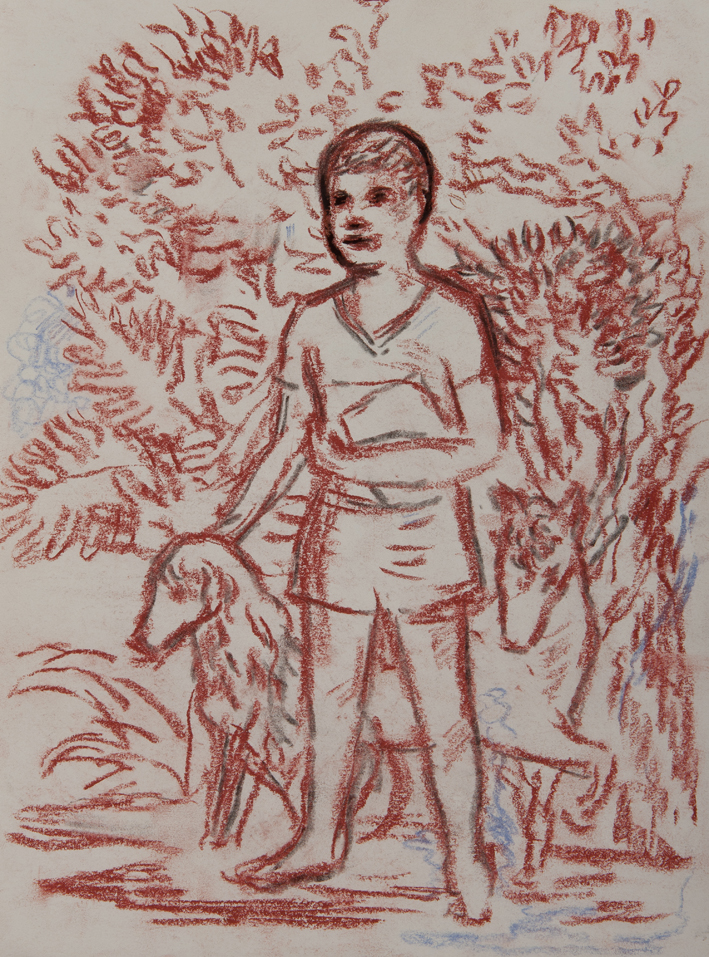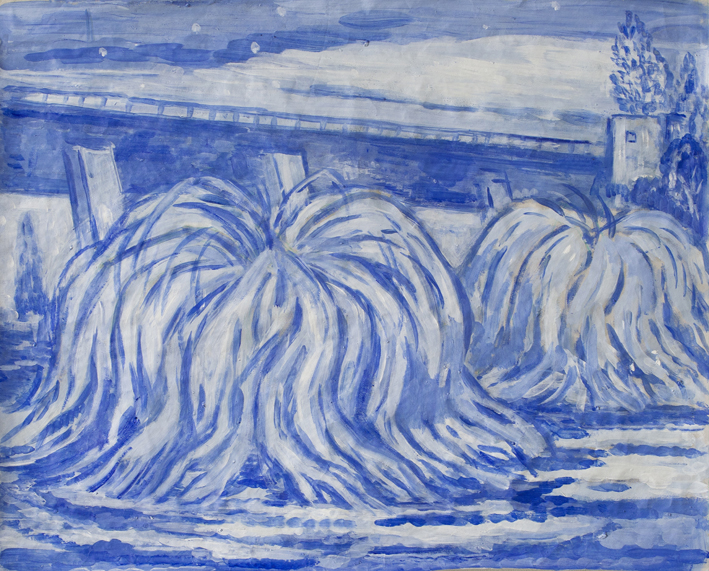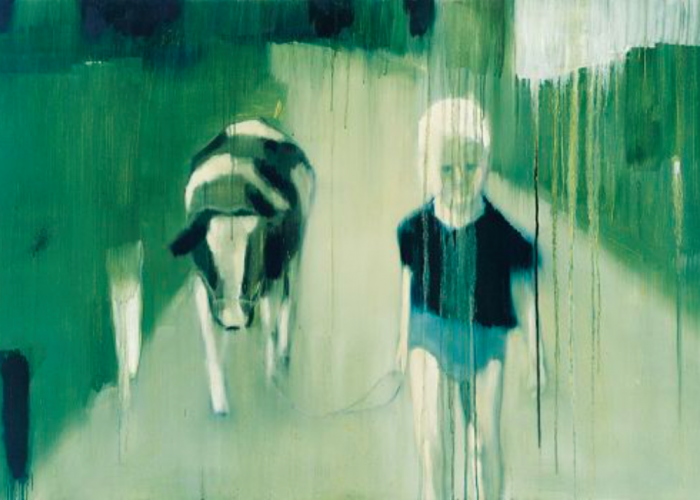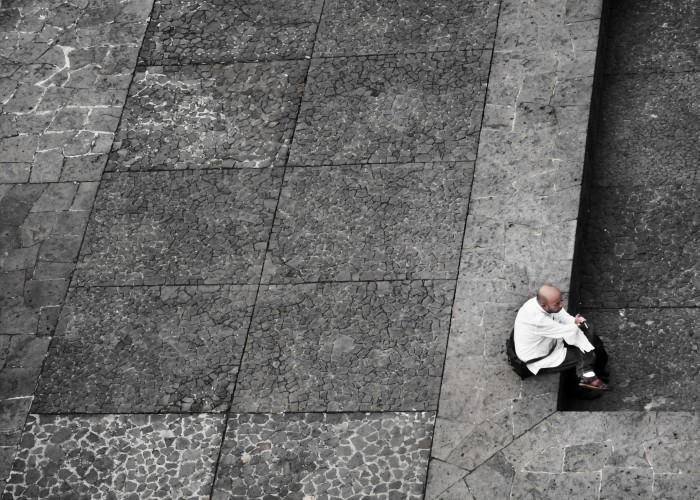Daniela Lima
translated by Leah Leone
Diary of Vienna
A young boy carries a bucket of water. Its weight seems somehow lightened by the belief that the desiccated tree will come back to life if watered every day. The end of the story is less important than the image of his persistence—and his faith. I cannot conceive of anything more idiotic than faith, especially with respect to faits accomplis. The tree is dead. The feeling I have is that death appropriates everything, as if taking something back something that had been his all along.
It is impossible to halt the processes that take over the body, after death. The body stops being a body, after death. Death arrogates the deepest, most intimate spaces. The darkness is complete, the silence, the body that continues but does not go on, after death. I am too modest to speak of all the processes the body undergoes, after death. I feel we shouldn’t know them—or question them. It’s enough to say that, at this very moment, we are already dying.
Love is the only means of reconciliation with death. Opening the body, letting yourself be touched with devotion and integrity. L’amour fou is always reciprocal and unique. A face that endures. A body familiar and unknown. Every touch is a new touch; a step backwards in the process of recognition. First time, first time again. I will not find that body here, in this city, but here is where I must find it. But it is here that I insistently must find it.
Vienna, 14 November 2012.
Ruminations on the Common Man
The common man constructed a series of well-defined values. We could summarize them as follows:
Works: it’s good. Doesn’t work: it’s bad.
The common man divides human beings into those that “work” and those that “don’t work.” These two categories must never bleed over into one another. The common man believes the strong must protect themselves from the weak. And he knows: nature is pragmatic in the elimination of the weak.
The common man sees and accepts things as they are. The common man does not admit that things could be any other way.
The things that exist have value. The things that could not exist do not have value.
The common man has no sense of possibility. The common man is the man of the possible. He does not dream, does not aspire to change anything, or anyone. And he does not aspire, above all, to change himself.
The common man believes that pragmatism and clarity are indispensable qualities.
The common man considers any kind of idealism synonymous with insanity. And insanity synonymous with weakness. The common man is moved by stories of the heroes of daily life, able to pay their bills, raise children and take an annual trip abroad.
The common man abominates heroic acts. Heroic acts are not the acts of heroes, but of weak-minded individuals with no sense of reality.
The common man has no time for melancholy and wants to be left in peace. Peace is synonymous with existing solely in the present, immersed in the routine of work.
The common man lacks nothing. There is enough of everything for the common man.
Fable for remaking people
Upon reading the second paragraph, he was already facing the forest. Trees in even rows, straight. The sketch for an old drawing. In the center of the drawing, a point to which the things and the people were attracted. Precipices.
The forest is impenetrable, as are all things unknown. In the center of the face, the eyes. A forest of lead, abandoned, everything swallowed up.
Standing before the forest, it was like taking back something that had always been his. The sun opening the forest: leaf, fruit, tree, insect, everything was light. Everything always was. And always would be.
There was no escaping those mornings; light that invades, exposes. The points, the eyes like precipices. In the center of the drawing, the soft face, one that might not resist a light touch. Innocent of all.
Sitting before the forest, the saddest man in the world was not sad. The saddest man in the world was dreaming.
* *
Images: Nahuel Vecino “sobre papel”, “Long Champs” (2013), courtesy of miau miau
* *
Diário de Viena
Um garotinho carrega um balde d’água. O peso parece reduzido pela crença de que a árvore seca reviveria, se fosse molhada todos os dias. O fim da história é menos importante do que a imagem de persistência – e de fé. Não consigo imaginar maior estupidez do que ter fé, especialmente contra fatos consumados. A árvore está morta. A sensação que tenho é de que a morte se apropria de tudo, como se tomasse de volta algo que sempre foi dela.
Não é possível parar os processos que se instalam no organismo, após a morte. O corpo deixa de ser corpo, após a morte. A morte toma os espaços mais profundos e mais íntimos. É a escuridão completa, o silêncio, o corpo que continua sem prosseguir, após a morte. Tenho pudor de falar sobre todos os processos que envolvem o corpo, após a morte. Sinto que não devemos conhecê-los – ou questioná-los. Basta repetir que, neste momento, já estamos morrendo.
O amor é a única via de reconciliação com a morte. Abrir o corpo, se deixar tocar com devoção e inteireza. L’amour fou é sempre recíproco e único. Um rosto que persiste. Um corpo familiar e desconhecido. Cada toque é um novo toque; um passo atrás no processo de reconhecimento. Primeira vez, primeira vez de novo.
Não encontrarei este corpo aqui, nesta cidade, mas é aqui que devo procurá-lo. Mas é aqui que devo insistentemente procurá-lo.
Viena, 14 de novembro de 2012.
Considerações sobre o homem comum
O homem comum construiu um conjunto de valores bem definidos. Poderíamos resumi-los da seguinte maneira:
Funciona: é bom. Não funciona: é mau.
O homem comum divide os seres humanos entre funcionais e disfuncionais. Essas duas categorias não podem jamais se misturar. O homem comum acredita que os fortes devem se proteger dos fracos. E sabe: a natureza é pragmática na eliminação dos fracos.
O homem comum vê e aceita as coisas como elas são. O homem comum não admite que as coisas poderiam ser de outra maneira.
As coisas que são têm valor. As coisas que poderiam ser não têm valor.
O homem comum não tem senso de possibilidade. O homem comum é o homem do possível. Não sonha, não pretende modificar nada, nem ninguém. E não pretende, sobretudo, se modificar.
O homem comum acredita que pragmatismo e clareza são qualidades indispensáveis.
O homem comum considera qualquer tipo de idealismo sinônimo de loucura. E loucura, sinônimo de fraqueza. O homem comum se comove com histórias de heróis do cotidiano que são capazes de pagar contas, criar filhos e fazer uma viagem internacional por ano.
O homem comum abomina atos heroicos. Atos heroicos não são atos de heróis, mas de seres de mentalidade débil que não têm senso de realidade.
O homem comum não tem tempo para melancolia e quer ser deixado em paz. Paz é sinônimo de estar unicamente no presente e imerso em sua rotina de trabalho.
Nada falta ao homem comum. Tudo sobra ao homem comum.
Fábula para refazer pessoas
Quando leu o segundo parágrafo, já estava diante da floresta. Árvores alinhadas, retas. Rascunho de um desenho antigo. No centro do desenho, um ponto para o qual as coisas e as pessoas eram atraídas. Precipícios.
A floresta é impenetrável, como tudo que é desconhecido. No centro da face, os olhos. Floresta de chumbo, desamparo, tudo é tragado.
Quando estava diante dela, era como se tomasse de volta algo que sempre foi seu. O sol abrindo a floresta: folha, fruto, árvore, bicho, tudo era luz. Tudo sempre foi. E seria de novo.
Não havia como escapar daquelas manhãs; luz que invade, expõe. Os pontos, os olhos como precipícios. No centro do desenho, o rosto suave, como se não resistisse a um leve toque. Inocente de tudo.
Sentado diante da floresta o homem mais triste do mundo não estava triste. O homem mais triste do mundo sonhava.
[ + bar ]
Condensed Water
Anja Kampmann
About the Sea
The horizon is the concern here the
distance applying color the bright crackling
of surfaces of light and the spreading
of the light as it surges the... Read More »
Arrebato [madrid]
Juan Soto Ivars
I used to live in Madrid, but now I only go when I’m able, and feel like it. When I get there I perform certain... Read More »
Edipo [buenos aires]
Milton Läufer translated by Heather Cleary
It’s true: Edipo is an ugly bookstore. And yet, though this may seem like a contradiction, its most notable... Read More »
On Mario Bellatin
Edmundo Paz Soldán translated by Sarah Bruni
Fifteen years ago or so, I traveled to Lima in search of a shaman who would free me from the... Read More »



![Arrebato [madrid]](http://www.buenosairesreview.org/wp-content/uploads/castigado-700x500.jpg)
![Edipo [buenos aires]](http://www.buenosairesreview.org/wp-content/uploads/Screen-Shot-2013-04-20-at-11.16.56-PM-700x500.png)




 sending...
sending...